Goose eggs are a fun and delicious alternative to chicken eggs, with a richer flavor and larger size. The giant eggs are only available for a few months in the spring so get them while you can!
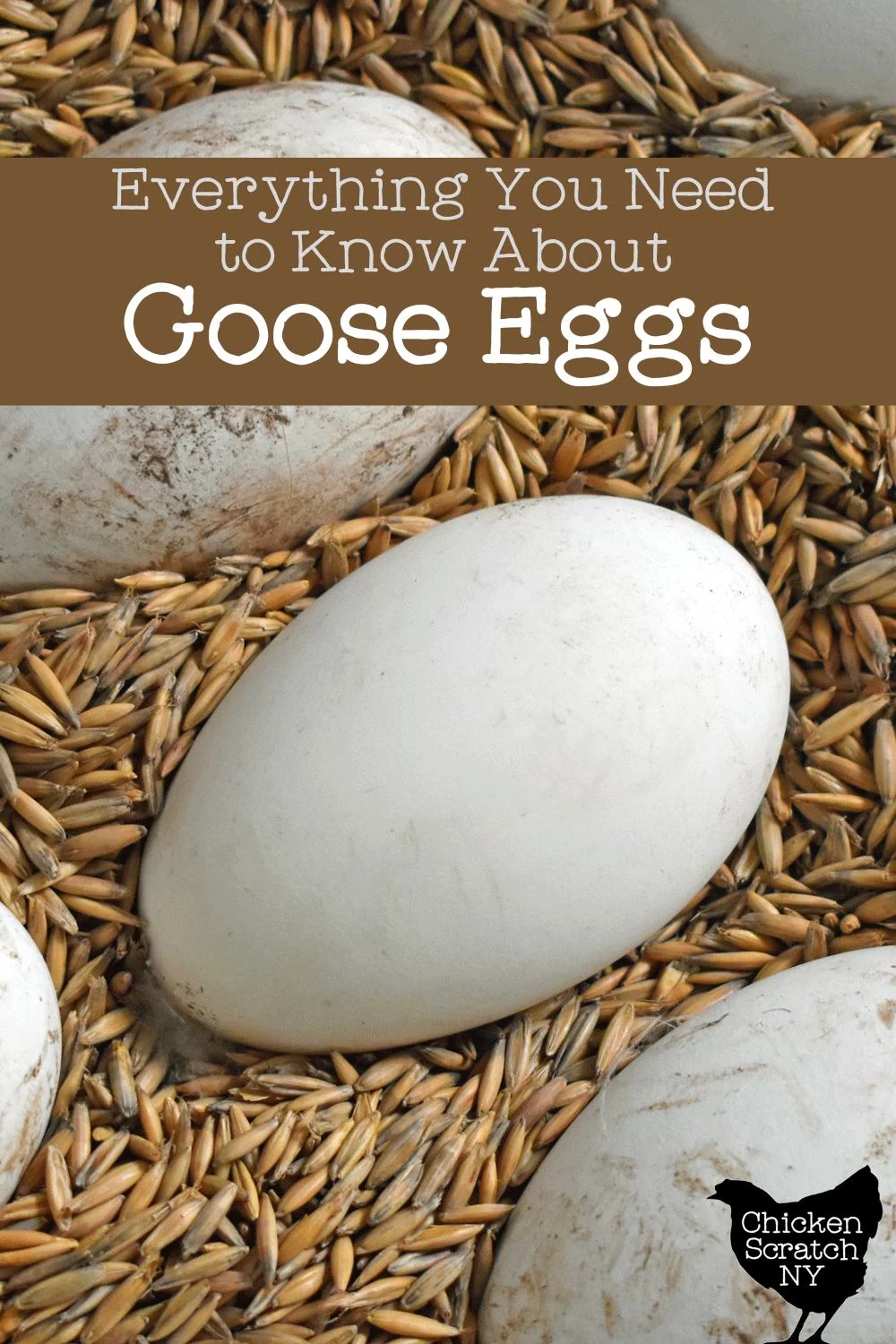
My favorite thing to do with goose eggs is handing them to people when they leave my house, as a sort of confusing parting gift. Of course, you can also eat them, or with some work, turn them into more geese.
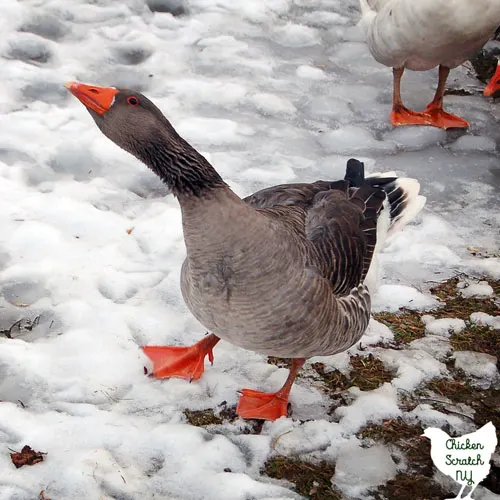
I would recommend you do some soul-searching with that last one and really put some thought into adding more geese to the world.
Physical Characteristics
There are two things that really separate goose eggs from the rest of the barnyard eggs (I also keep chickens, turkeys, ducks, and feathered demon clowns guinea fowl). The most obvious is the size, and the less obvious is the shell.
Goose eggs are huge. I have pilgrim and Toulouse geese and their eggs are 6-7 ounces.
There is quite a bit of variation in size over the laying season, usually, the first few eggs are on the smaller side and then they even out to be gigantic.
When my kids were younger I used to tell them they were dinosaur eggs. Jokes on me though because when spring hormones hit the male geese think they’re all T-rexes.
Goose eggs are either white, creamy white, or covered in mud and the shells are thick (or thiccc with 3 c’s as the kids say).
Breaking one open is always a fun time, you have to hit the shell hard pretty hard to crack it. If you hit a chicken egg that hard it would simply explode.
I gave one to my grandma to surprise my grandpa for breakfast, she said she considered pulling out a hammer to break it open!
Collecting & Storing
Unlike chickens that pop out eggs consistently, geese are seasonal layers. They start laying eggs in late winter/early spring and they’ll only lay for a few months.
Finding the first goose egg of the year is always a fun time, it’s usually on the ground in a random location. It seems like the first one always sneaks up on them.
Once they realize what they’re doing they get a bit more deliberate with it and start creating nests/digging holes to lay their eggs in.
At this point I really don’t want more geese, I have 12 plus Baby Goose who thinks he’s a duck, so I’ve been stealing most of the eggs. I’ve been leaving one particularly gross egg behind in an effort to keep the geese laying in the same spot.
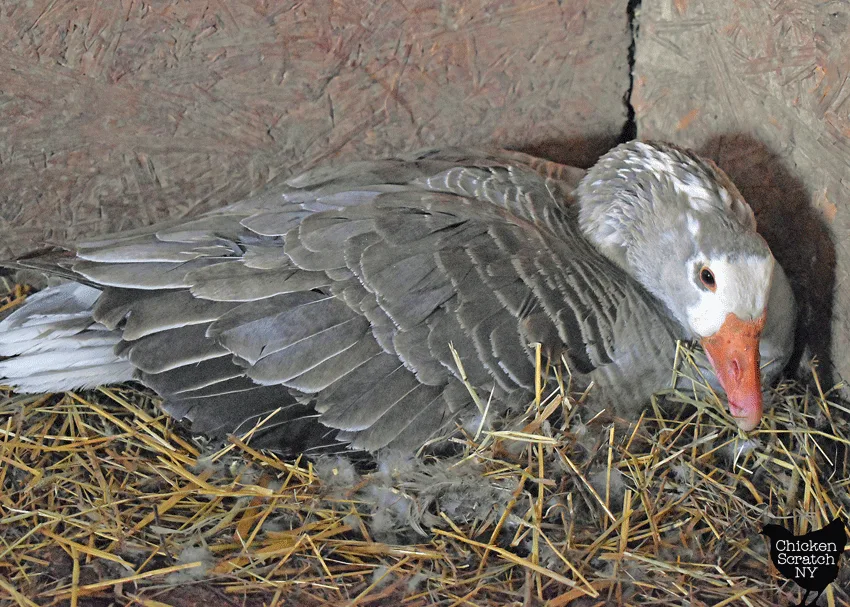
Update: I again failed and have a broody goose…
A handful of my geese go broody every year, and they turn into miserable hissing snake demons. I have a very low tolerance for violence from my animals but broody birds and mamas are the only exceptions.
Once you find the nest, I recommend waiting until the geese are off to collect your eggs. They will leave once or twice a day to eat and make the biggest poop you’ve ever seen in your life.
Geese, in a flock, aren’t that friendly to outsiders, and when they’re in a nest they’re downright mean. Not only will they bite you, but they’ll also beat you with their wings & summon the other geese to do the same.
Read more about Broody Hens
As a mother myself, I recognize the urge to snap at anyone who gets too close to my kids, and let’s be honest, I don’t want to raise their babies so I’m happy to leave them to it.
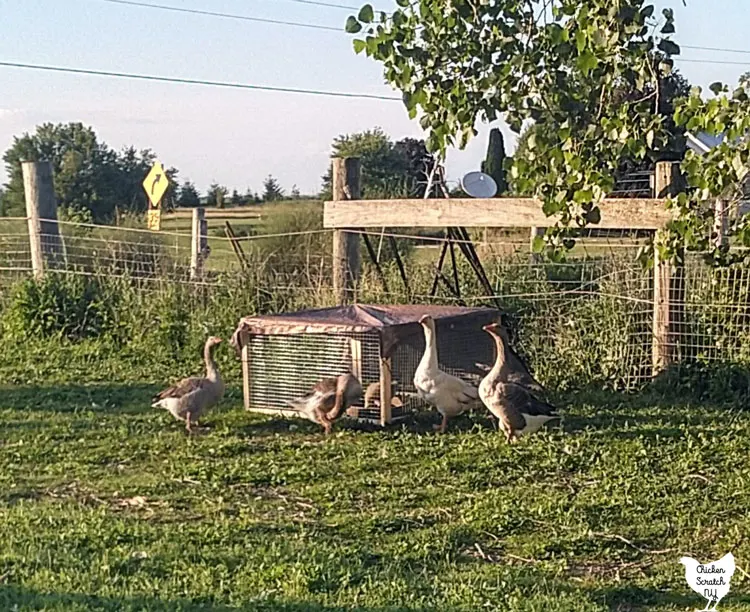
For all their faults (the constant pooping and absolute disrespect for fences) geese really do make amazing parents. Unlike chickens or turkeys that have to be tricked into it, they will adopt any gosling they find and raise them in a large group.
I usually steal the goslings for a week or so to give them a chance to get sturdy before they go on epic journeys with the adults and I’m usually fighting for my life to get the goslings back in the house after the adults have noticed them.
If you aren’t making more geese you’ll want to store the (unwashed) eggs in a cool place or in the fridge. You won’t have much luck fitting them in a carton, I usually keep them in a bucket where the thick shells help keep them safe from getting crushed.
As for how long you can store your goose eggs, the internet has again been less than helpful. There is a bit of a pattern where one person says something and then everyone else repeats the same things over and over (it’s going to get a lot worse with AI writing taking over).
The consensus seems to be 6 weeks in the fridge or 2 weeks on the counter. Have I used goose eggs outside that very narrow tome frame? Absolutley.
How Many Eggs Does a Goose Lay per Year?
The exact number of eggs your geese will lay depends on a lot of factors including age, health, breed, and how diligently you collect them.
You can expect to get more eggs if you keep them collected, geese will stop laying when they go broody. Some geese may lay again after hatching their first brood but even if they do, you’re still missing out on at least a month of eggs.
Chickens start to lay when they’re about 20 weeks old but you don’t get that lucky with geese. Instead, you’ll need to wait at least a year or possibly two for them to reach maturity and get those seasonal cues that trigger laying.
Here is a general idea of what you can expect:
- African – 20-40
- American Buff – 10-25
- Chinese – 40-100
- Cotton Patch –
- Emden – 30-40
- Pomeranian – up to 70
- Pilgrim – 35-45
- Roman – 25-35
- Sebastopol – 30-50
- Toulouse – 25-40
Obviously, the standouts here are the Chinese geese (also called swan geese), laying 2-4 times as many eggs as the others.
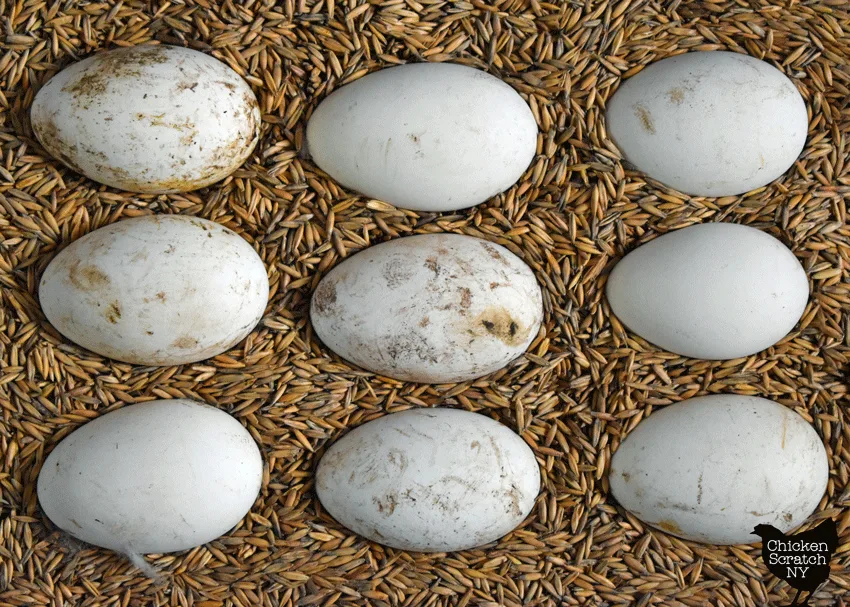
I have both Pilgrim and Toulouse geese, they’re allowed to free range and despite my best efforts, I know I miss out on quite a few of their eggs. Despite that my small flock gives me more than enough eggs for personal use.
I don’t keep geese for eggs, instead, they’re supposed to be lawnmowers and guard dogs. For the most part, they just give me daily exercise & anxiety when they escape and hang out on the road for funsies.
My original batch of geese was purchased to weed my now-dead orchard but in 2023 I began the process of planting a new and improved orchard complete with 4′ tall welded wire fencing that the big jerks can’t squeeze through.
As a result of my newly installed fencing, I’ve been finding way more eggs this year than I normally do which leads me to believe there were quite a few hidden nests out in the woods and fields surrounding the property.
Cooking with Goose Eggs
Once you’ve got your hand on some goose eggs (either because you successfully raised your own or you visited my house and I handed you one when you left) it’s time to cook them up!
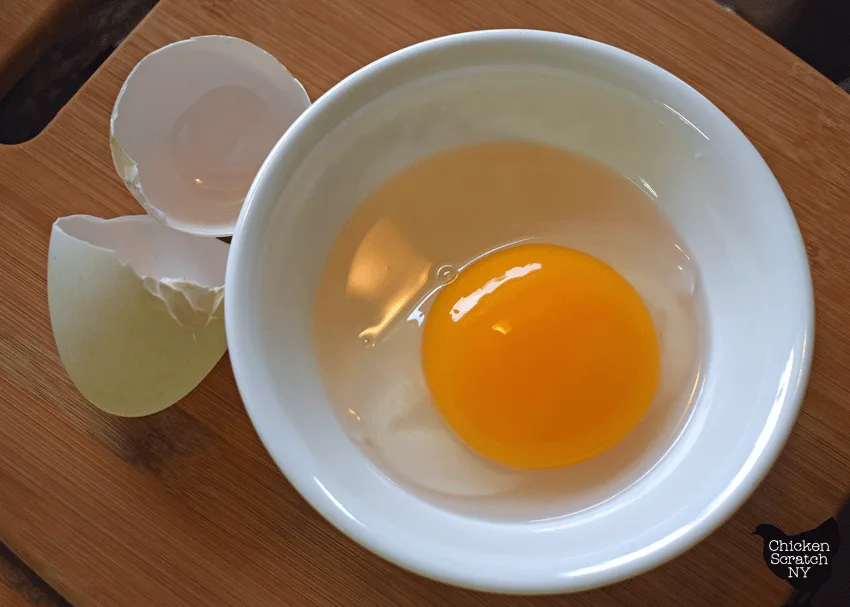
I think the easiest way to use goose eggs is in a recipe that isn’t really a recipe like an omelet, scrambled eggs, or even a frittata. Anywhere a rough estimate is going to work, a single goose egg is about equal to 3 large chickens eggs.
The biggest difference is the amount of yolk you get, goose egg yolks are proportionally much larger than chicken egg yolks and add an extra richness to a recipe making them popular for baking (duck eggs are very similar).
I whipped up a quick Goose Egg Aioli by blending up a palm-sized goose egg yolk, dijon mustard, white balsamic vinegar, salt, pepper, and too many garlic cloves with my immersion blender and slowly pouring in grapeseed oil until I liked the texture. It is aggressively garlicky but A+ on a sandwich!
The goose egg yolk did a great job emulsifying the oil and the garlic covered up any strong flavor notes. I’m not a yolk hater by any means but if you’re used to supermarket eggs, the flavor of a fresh, grass and bug-fed egg yolk can really throw you for a loop!
Eating goose eggs seems to be more popular in England than in the US so most of the recipes I found are not written for an American audience but I think it’s worth the effort to give them a shot!
- Goose Egg Lemon Curd from The Simple Things
- Lavender Chocolate Goose Egg Cake from Tin & Thyme
- Poached Goose Egg from Tyrant Farms
- Fried Goose Egg with Caper and Lemon Crust from Great British Food Awards
- Soft-Boiled Goose Egg from Just a Pinch
- Goose Egg Custard from The Elliot Homestead
- Goose Egg Carbonara from Padstow Kitchen Garden
Other Uses for Goose Eggs
The thick shells make goose eggs perfect for crafting. They hold up well to carving and the large size makes them a great option for elaborate Pysanky designs.
You can also dye a few to add some extra excitement to your annual egg hunt! According to BBC Good Food, it takes 13 minutes to hardboil a goose egg.
Carving and pysanky will require blowing out the inside of the eggs first. The hardest part of blowing out a chicken egg is not breaking the shell, the hardest part with a goose egg is drilling the initial holes.
If your eggshells are messy I recommend getting them as clean as possible before you blow them out, the shells are sturdiest before you add any holes and you can really scrub without worrying about shattering the egg.
I used my Dremel to make two holes, a small one in the top and a slightly larger hole in the bottom. Then I used a metal pick to scramble up the egg and blew it into the smaller hole.
It actually went much smoother than I had anticipated, goose eggs are a lot easier to handle because of the thick shells and that helps a lot with the blowing.
Check out my Livestock page for more info or start here:

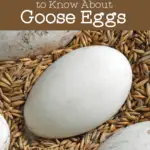
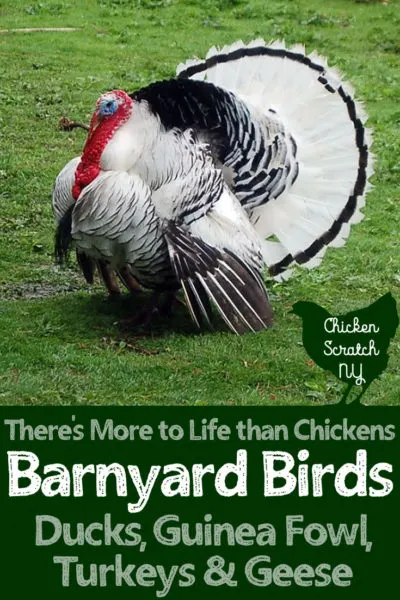

Emily
Thursday 20th of June 2024
Hilarious read! I am now convinced that I do not need geese, but I sure would love to have some for the crafting aspect.
Maddie
Sunday 14th of April 2024
I found some goose eggs in my yard today and I put them in a stick tp I made. Is that a good idea?
Alecia
Thursday 25th of April 2024
No, you should leave wild goose eggs alone. This article is about domestic goose eggs
Svetlana
Wednesday 27th of March 2024
What a fun, loving and informative post! I enjoyed it very much and now I know what to do with the eggs I got from my colleague. We work at the safety company in The Netherlands and sometimes your colleagues surprise you with non-work related things. :-) I've started to read your post and immediately I thought - oh, why I cannot keep one egg to grow my own goose...:-( Unfortunately we live in the city flat, but maybe one day! I'm inspired! Thank you very much and bless you and all your geese and chickens! P.S.: now I have to ask my colleague which geese he has. I never knew that there is a Sebastopol goose existing. It's the name of my birthplace!
Lindsay
Friday 8th of March 2024
How do u determine how to price eggs for consumption?? Say a doz??
Alecia
Thursday 21st of March 2024
I've never sold goose eggs so I can't be any help with that. You best bet is to find someone locally selling and see if their prices work for you
Karla
Sunday 31st of December 2023
I really appreciate this article. It’s hard to find thorough articles about geese and their eggs! My African geese are only 7 months old, but started laying edges at the same time as our young chickens. They eat grass and Mazuri waterfowl food. Everything I read says they will take longer than this to lay….yet they are laying often. They are a good weight, well exercised, so I’m not sure why this is happening.
Are you comfortable eating goose eggs often (if you have time to answer)? We have been enjoying them, but I have some concern over the very high cholesterol content in them. From what I’ve read, there’s not much evidence at all that cholesterol in chicken eggs causes any kind of trouble for most people, but the level of cholesterol is so high in goose eggs. They are so rich in many good things—iron, protein, Omegas, vitamins…. I’d love to eat them without any hesitation!
Alecia
Tuesday 2nd of January 2024
I have a love-hate relationship with eggs, a few years ago I started going through random phases where they make me incredibly sick and as a result I don't actually eat that many eggs (the irony of a chicken blogger unable to eat eggs is not lost one me!) From what I've read, dietary cholesterol from eggs isn't nearly as big a deal as scientists used to believe.